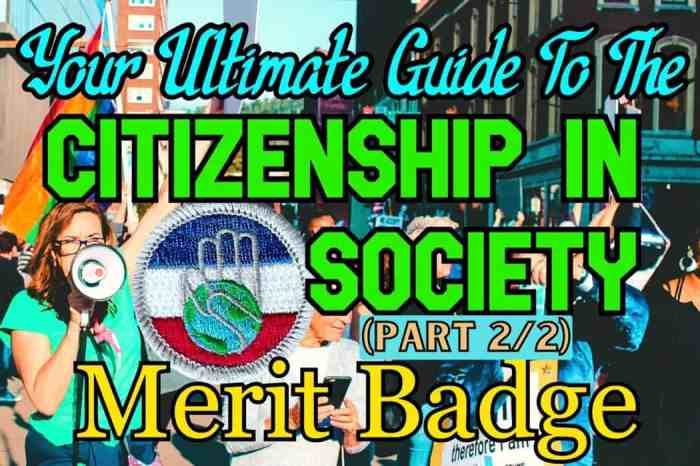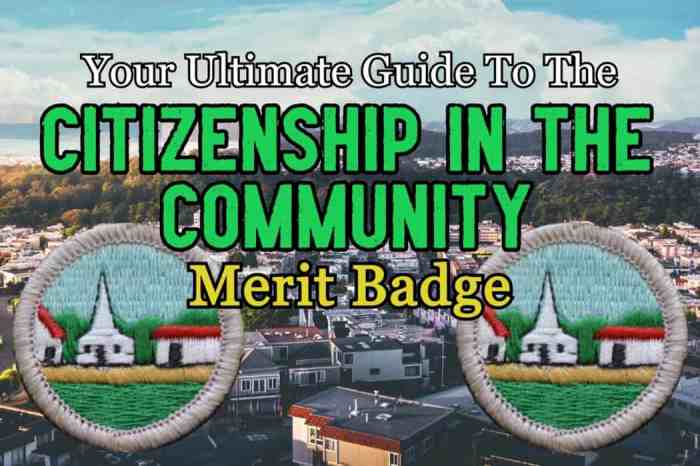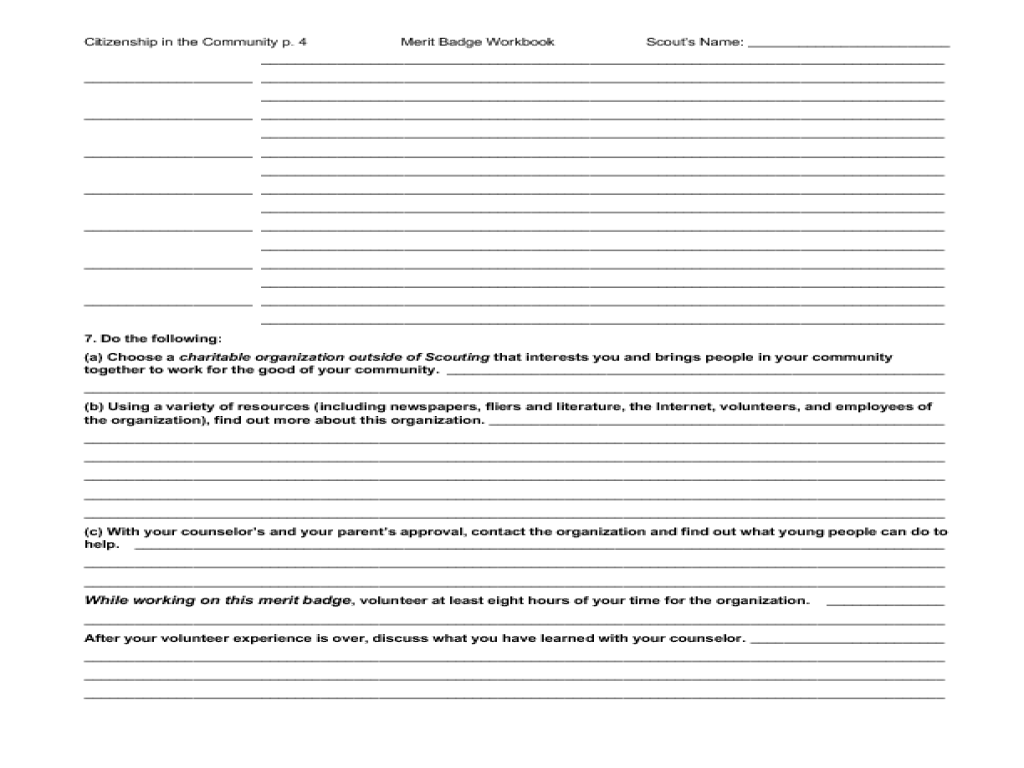Delving into the intricacies of citizenship in the community merit badge packet answers, this comprehensive guide unravels the essence of active citizenship, its significance, and the multifaceted roles and responsibilities it entails within a community. Embark on a journey to explore the challenges and strategies associated with fostering an engaged and inclusive community, while examining the vital role of civic education and assessment in nurturing a thriving citizenry.
Definition and Importance of Citizenship

Citizenship refers to the formal and legal relationship between an individual and a political community, typically a nation or state. It involves rights, responsibilities, and privileges that define the individual’s place within the community and their connection to its institutions and values.
Active citizenship is essential for the health and well-being of any community. It allows citizens to participate in the decision-making processes that affect their lives and contribute to the betterment of society. Engaged citizens are more likely to trust their leaders, feel connected to their community, and be satisfied with their quality of life.
Roles and Responsibilities of Citizens
Citizens play various roles within their communities, including:
- Voters:Participate in elections and referendums to choose their representatives and decide on important issues.
- Jurors:Serve on juries to help decide the outcome of legal cases.
- Public Officials:Hold elected or appointed positions to represent the interests of their constituents and make decisions on behalf of the community.
- Volunteers:Contribute their time and skills to support non-profit organizations, community projects, and other charitable causes.
Citizens also have certain responsibilities associated with their status, such as:
- Obeying the law:Respecting and following the laws and regulations established by the government.
- Paying taxes:Contributing financially to the funding of public services and infrastructure.
- Serving on juries:Participating in the judicial process when called upon.
- Protecting the environment:Taking actions to minimize their impact on the natural world and promote sustainability.
Community Involvement and Engagement
Citizens can actively engage in their communities in many ways, including:
- Volunteering:Offering their time and skills to support non-profit organizations, community projects, and other charitable causes.
- Attending community events:Participating in local festivals, parades, sporting events, and other gatherings that foster a sense of community.
- Supporting local businesses:Patronizing businesses owned and operated by members of the community.
- Participating in community organizations:Joining clubs, groups, or associations that align with their interests and values.
- Mentoring and supporting youth:Guiding and providing opportunities for young people in the community.
Challenges to Community Citizenship
Despite the importance of active citizenship, there are several potential barriers that can prevent individuals from fully participating in their communities, including:
- Lack of time:Busy schedules and competing demands can make it difficult for people to find time to volunteer or participate in community activities.
- Lack of resources:Financial constraints or limited access to transportation can hinder people’s ability to participate in certain community events or activities.
- Lack of information:Individuals may not be aware of opportunities for community involvement or may not have access to the necessary information to get involved.
- Discrimination and exclusion:Some individuals may face discrimination or exclusion based on their race, ethnicity, gender, sexual orientation, or other factors, which can prevent them from fully participating in community life.
Citizenship and Civic Education
Education plays a crucial role in promoting citizenship values and skills. Schools, community organizations, and the media can all contribute to civic education by:
- Teaching about citizenship:Providing students with knowledge about the rights, responsibilities, and values associated with citizenship.
- Developing civic skills:Offering opportunities for students to practice civic skills, such as critical thinking, problem-solving, and communication.
- Encouraging community involvement:Promoting and supporting student participation in community service and other civic activities.
- Modeling civic behavior:Educators, community leaders, and media personalities can serve as role models for civic engagement and inspire others to participate.
Measuring Community Citizenship
Assessing the level of citizenship engagement within a community is important for identifying areas where improvements can be made. Different methods for measuring community citizenship include:
- Surveys:Conducting surveys to gather data on citizens’ attitudes, beliefs, and behaviors related to citizenship.
- Observational studies:Observing and recording citizens’ participation in community events, meetings, and other activities.
- Analysis of public records:Examining data on voter turnout, jury service, and volunteerism to assess levels of civic participation.
- Community audits:Conducting comprehensive assessments of community resources, programs, and policies to identify areas where citizenship engagement can be strengthened.
Case Studies and Examples, Citizenship in the community merit badge packet answers
Numerous individuals and groups have demonstrated exemplary citizenship in their communities. Some notable examples include:
- Rosa Parks:Refused to give up her seat on a bus to a white man in Montgomery, Alabama, sparking the Montgomery bus boycott and the Civil Rights Movement.
- Martin Luther King Jr.:Led the Civil Rights Movement in the United States, advocating for nonviolent resistance and racial equality.
- Mahatma Gandhi:Led the Indian independence movement against British colonial rule, promoting nonviolent civil disobedience and self-reliance.
- Malala Yousafzai:Pakistani activist who spoke out for the education of girls, survived an assassination attempt, and continues to advocate for peace and equality.
- The Peace Corps:A U.S. government program that sends volunteers to work in developing countries, promoting peace, friendship, and understanding.
User Queries: Citizenship In The Community Merit Badge Packet Answers
What are the key responsibilities of a citizen in the community?
Citizens are expected to participate in civic activities, engage in decision-making processes, obey laws, and contribute to the well-being of their community.
How can individuals overcome barriers to active citizenship?
Strategies include time management techniques, seeking support from community organizations, and leveraging technology to facilitate participation.
What is the role of civic education in promoting citizenship?
Civic education instills values, knowledge, and skills necessary for active citizenship, empowering individuals to make informed decisions and contribute effectively to their communities.

